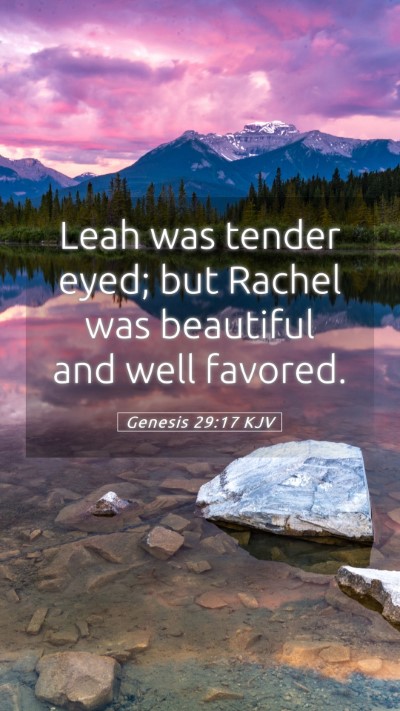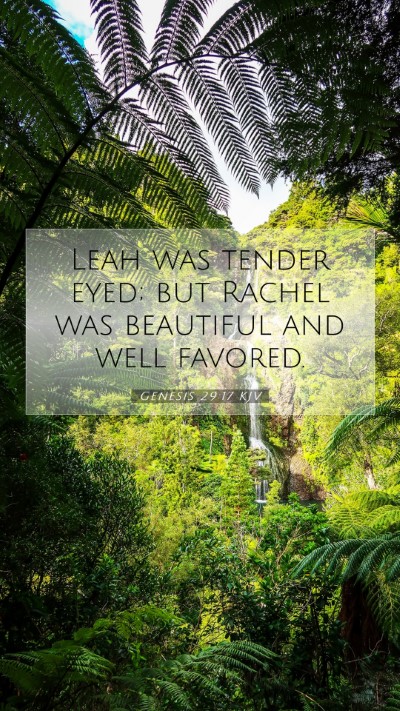Bible Verse Meaning: Genesis 29:17
Genesis 29:17 states, "Leah was tender eyed; but Rachel was beautiful and well favored." This verse succinctly introduces Leah and Rachel, the daughters of Laban, highlighting the contrast between the two sisters. The description not only emphasizes their physical appearances but also sets the context for the unfolding narratives regarding their relationships and the attached emotions of love, jealousy, and rivalry.
Understanding Scripture
The meaning of this verse has been explored by various biblical scholars, and we will summarize insights from trusted public domain commentaries such as those by Matthew Henry, Albert Barnes, and Adam Clarke.
Insights from Commentaries
-
Matthew Henry:
In his commentary, Henry discusses the significance of Leah's physical attributes, describing her as "tender-eyed," which some interpretations suggest may mean her eyes were weak or that she was not as comely as Rachel. He contrasts Leah’s gentleness and modesty with the striking beauty of Rachel, noting that Jacob's affections lay firmly with Rachel. This observation prompts deeper reflections on how physical appearances can influence relationships and personal dynamics.
-
Albert Barnes:
Barnes emphasizes the emotional aspect of the narrative, referring to the implications of Rachel's beauty and the feelings it evokes in Jacob's heart. He reflects on how Leah's placement as the "less favored" daughter becomes pivotal to the relational tensions in the story. Barnes invites readers to consider the broader themes of favoritism and its effects on family life, encouraging an exploration of human emotion during biblical times.
-
Adam Clarke:
Clarke provides an in-depth examination of the Hebrew terms used in this verse. He notes that "tender-eyed" may carry connotations beyond mere physical description, potentially linking to Leah's character and gentle nature. Clarke argues that this contrast between Leah and Rachel sets the stage for the ensuing drama of love and rivalry, serving as a critical foundation for understanding the dynamics between Jacob, Leah, and Rachel in the broader story of Genesis.
Bible Verse Commentary
In the exploration of Genesis 29:17, one can glean various important insights relevant not only to historical understanding but also to contemporary applications of biblical texts. The differing descriptions of Leah and Rachel reflect the diverse perspectives on beauty and worth.
Key Themes and Meanings
-
Contrast in Physical Appearance:
The juxtaposition serves to highlight societal values regarding beauty and physical desirability, raising questions about superficial judgments that often govern relationships. How does this biblical context translate into modern-day scenarios where appearances hold undue value?
-
Family Dynamics:
This passage foreshadows the ongoing family tensions that will arise from Jacob's favoritism towards Rachel over Leah. It prompts considerations on how favoritism can disrupt family harmony and create emotional turmoil.
-
The Role of Women:
The text invites readers to appraise the roles of Leah and Rachel within their cultural setting, prompting reflections on women’s identities beyond physical attributes in biblical narratives.
Scripture Analysis and Biblical Exegesis
Genesis 29:17 is situated within a larger narrative involving themes of love, desire, and competition. Through biblical exegesis, one can identify how these aspects play out as Rachel and Leah compete for Jacob's affection, representing broader human experiences of longing and rivalry. The significance of this verse extends to its implications on personal relationships, the often subjective nature of beauty, and inherent value that transcends external appearances.
Related Bible Cross References
- Genesis 29:18: "And Jacob loved Rachel; and said, I will serve thee seven years for Rachel thy younger daughter."
- Genesis 30:1: "And when Rachel saw that she bare Jacob no children, Rachel envied her sister."
- 1 Peter 3:3-4: "Whose adorning let it not be that outward adorning of plaiting the hair, and of wearing of gold, or of putting on of apparel..."
Applying Bible Verses to Daily Life
Modern readers can benefit from the insights of Genesis 29:17 by considering their own relationships and the impact of external appearances on personal connections. Understanding the emotional complexities within biblical narratives can help facilitate deeper discussions within Bible study groups or online Bible study forums, how individuals often navigate interpersonal dynamics based on perceptions and expectations influenced by society.
Concluding Remarks
Genesis 29:17 is more than a mere description; it opens up avenues for profound understanding of human emotions, the perils of favoritism, and the search for worth. Engaging with this scripture can enhance your appreciation for the intricate depictions of relationships within the Bible, providing fertile ground for further Bible study insights, lessons, and reflections on the meaning of Bible verses.


